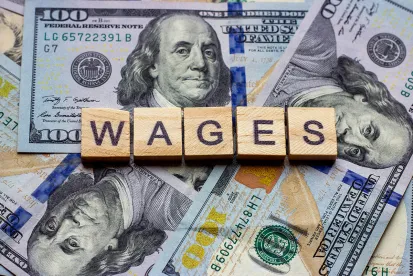Within the last year, the U.S. Department of Justice (DOJ) brought its first indictments alleging criminal wage-fixing conspiracies and criminal no-poach conspiracies among competing employers. In December 2020, DOJ indicted the president of a staffing company for violating Section 1 of the Sherman Act by allegedly conspiring with competitors to fix wages paid to physical therapists. A month later, DOJ indicted a corporation for violating the Section 1 of the Sherman Act because it allegedly entered into “naked no-poach agreements,” pursuant to which it agreed not to solicit senior employees of two competitors In March 2021, DOJ filed its second wage-fixing indictment, which also alleged a conspiracy to allocate workers. As reported here and here, these indictments were the culmination of the DOJ’s Policy, contained in its 2016 Antitrust Guidance for Human Resource Professionals (“Antitrust Guidance”) to bring criminal charges against employers who conspired to suppress wages, either through wage-fixing agreements or naked no-poach agreements.
At the time of the second indictment, we explained that the indictments alleged that the wage-fixing and no-poach agreements were illegal per se, which means that the agreements are presumed to be illegal, without any evidence of their anti-competitive impact. We also explained that no case had squarely held that either a wage-fixing conspiracy or a naked no poach agreement was illegal per se and that the law on this issue was unsettled. Because Section 7-1.100 of DOJ’s Manual generally limits criminal prosecution of Sherman Act violations to cases involving agreements that are illegal per se, we predicted that these indictments would yield decisions analyzing whether wage fixing and no poach agreements were illegal per se. Thus, it was not surprising when the defendants in the first wage-fixing case moved to dismiss the indictment, arguing that the alleged wage-fixing conspiracy did not amount a per se violation of the Sherman Act and that they did not receive fair warning that the conduct at issue was criminal.
On November 29, 2021, the Court denied the defendants’ motions to dismiss. In United States v Jindal, (ED Tex. No. 20-cr-00538), the Court found that the indictment could stand only if it alleged a per se violation of the Sherman Act. However, unlike the 2019 decision in In re Railway Ind. Employee No-Poach Litigation (W.D. Pa No. 18-798), the Jindal decision had little difficulty concluding that a wage-fixing agreement is simply a form of price-fixing agreement, and is thus illegal per se. The Jindal decision emphasized that two Supreme Court cases, Goldfarb v. Va. State Bar, 421 U.S. 773, 782 (1980) and Fed. Trade Comm’n. v. Superior Ct. Trial Laws. Ass’n., 493 U.S. 411, 436 n. 19 (1990), recognized that agreements to fix prices for services had been subjected to the per se rule. It also cited Anderson v. Shipowner’s Ass’n. of the Pac. Coast, 272 U.S. 359, 361-65 (1926), for the proposition that the Supreme Court recognized that the Sherman Act applied to labor markets “more than a century ago.” The Court also found that the Sherman Act is not limited to agreements that impact the prices paid by consumers, purchasers, competitors, or sellers, but also protects employees. Finally, Jindal cited Justice Kavanaugh’s concurrence NCAA v. Alston, 141 S.Ct. 2141, 2167-68 (2021), as support for the proposition that wage-fixing is simply a form of illegal price-fixing, even though the Supreme Court reviewed the NCAA’s limits on educational benefits provided to college athletes under the Rule of Reason. The Court therefore concluded that “fixing the price of labor, or wage fixing, is a form of price fixing, and thus, illegal per se.”
The Court also rejected defendants’ constitutional challenges to the indictment. Although the indictment was the first criminal prosecution of a wage-fixing conspiracy, the Court found that defendants had fair notice because price-fixing conspiracies have been deemed illegal per se for more than 100 years. The Court further found that its conclusion that wage-fixing is illegal per se was not a “‘novel’ construction of the Sherman Act,” but rather reflected the “logical application of precedent.” In addition, the Court concluded that the rule of lenity did not warrant dismissal because “decades of precedent make it clear that agreements to fix the price of labor – like all other price-fixing agreements – are per se illegal.” Thus, it found the rule of lenity did not apply because there was “no grievous ambiguity or uncertainty in this case.”
The Jindal decision provides the first clear statement that wage-fixing agreements between competing employers are illegal per se. This decision, along with the Biden Administration’s Executive Order on Promoting Competition in the American Economy, suggest that DOJ will continue to seek opportunities to pursue antitrust enforcement actions against employers. Hence, employers should exercise care in their communications about recruitment and compensation, and should seek counsel if they receive inquiries from DOJ, the Federal Trade Commission or their state counterparts. Finally, as reported here, DOJ will be holding a public forum workshop on promoting competition in labor markets on December 6-7, 2021.




 />i
/>i

